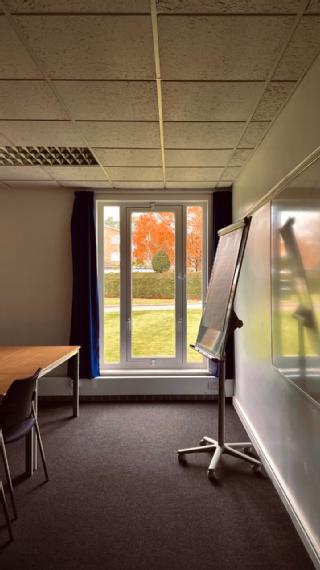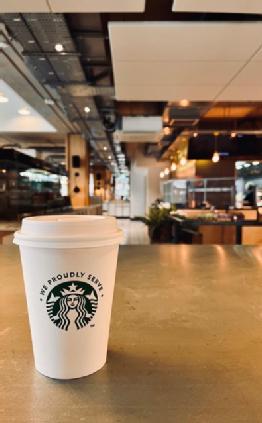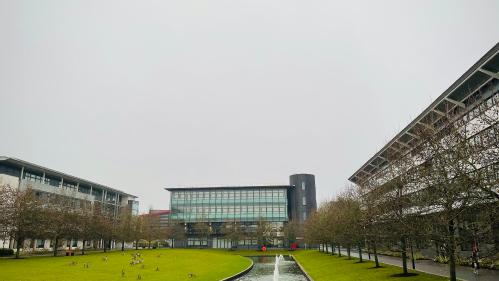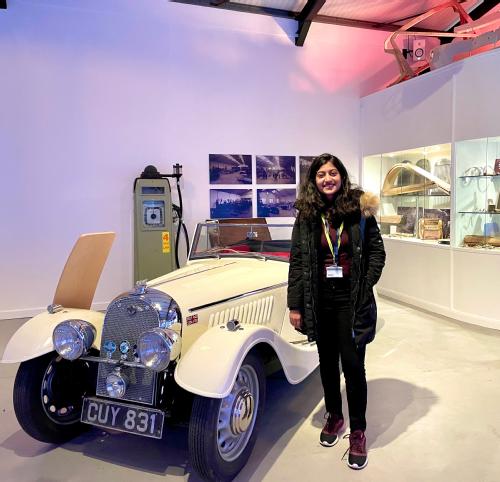Student Blog Collection
Life during a module week
The reason I say module week in the title is because WMG’s teaching methodology is unique and different from the one we would have generally experienced. Infact that’s what attracted to me apply for WMG’s SCLM course. Usually in our schools or bachelors, a day is allocated with different modules for 1 hour each but here at WMG, we have a module running for an entire week from 9am -6pm. Thus, it works in a block structure, you learn completely about the entire module with no other module topics clashing and it sure is focussed and intensive. It has both its pros and cons and thus, its best to evaluate your suitability before joining the course.
To visualise and understand this methodology better, here is what happens during the first day of Storage and Warehousing module.
9am - 10:30 am
We were introduced to the module, timetable and general guidelines
10:30am – 10:45am Short Break
10:45am - 12:30pm
Lecture on the role of warehousing in supply chain, warehouse trade-offs, importance of stock , significance of location. In-between this lecture, there were inbuild team exercises to keep us engaged and focussed. These activities include group discussion, calculations and presentations.
12:30 – 1:30pm Lunch Break
1:30pm – 3pm
Focused on the types of warehouse operations with industry examples and its requirements. Further discussion on the importance of health and safety – warehouse accidents, hazardous goods, significance of labels and principles of risk assessment
3:00pm – 3:15pm Short Break
3:15pm – 4:45pm
The lecture continued on warehouse processes and flow. We learnt about the warehouse functions and each function in detail with emphasis on lean, inbound and reverse logistics.
4:45pm – 5pm Short Break
5:00pm – 6:30pm
Detailed on ABC classifications, its layout and importance , pareto analysis , picking procedures, value added services and stock turn.
The next four days were more exciting as we learnt from industry guest lecturers and designed and simulated a warehouse all on our own. It was interesting to learn the practical knowledge, real life case studies from industry experts and consultants and also build a warehouse from scratch by calculating and evaluating the measurements while also incorporating all our learning from the week. We concluded the last day with familiarising ourself with the PMA, our in module assessment scores and also received chocolates from our kind professor.
These lectures are engaging and intensive as they run all day long thus the mind is focussed without any distractions in another module or submissions. Usually, it’s exhausting after every day, and I take rest the of the night off in preparation for the next day’s 9am class. And this does work out well as mostly the next week would be free week where you could focus on PMA’s , other activities you might need to complete or social activities.
Janani Alagarsamy
MSc Supply Chain and Logistics Management
A peek into SCLM course - How I got a Distinction (2 of 2)

Engineering Management Building, West Wood, University of Warwick
For those looking to join SCLM at WMG, this review of the modules will provide a better understanding of the course structure and teaching methodology. I have detailed on each module based on the lectures, seminar week and PMA experience. It also encompasses tips for writing successful PMA’s which I wish my alumni would have passed on. As promised, here is part 2 of modules I attended in term 2 in which I received a distinction and how you can too!
Transport Techniques and Management
Lecture and Seminar Week
This module was particularly interesting because we moved to in-person modules from here-on this term. We had intensive lecture on the first day covering maritime transport, road rail and intermodal transport, air freight and information technology in transport. The next four days where more engaging and hands-on as we had presentations, games and case studies to understand the transport hubs, use of intermodal transport and outsourcing.
We worked in groups and had ample time to discuss and analyse each activity from global perspectives. I found the activities valuable as I was able to critically evaluate the reason behind decisions and the theory being taught.
PMA Tips
To simply put, the more you research, you more you find information. That’s because eliminating irrelevant information is a task in itself. Though the PMA question was straightforward, it was a challenging as I couldn’t find ample number of relevant information to build my PMA. Thus, I spend numerous hours effectively researching and navigating sources. At circumstances like these, I relied on the lecture notes. It was highly effective as I could create a structure and map my research based on it. Also, since it was my second PMA, I had understood and improved myself on how to tackle PMA’s and received a Distinction!
Global Business and Environment
Lecture and Seminar Week
As the name suggests, I learned about the global supply chain. It was super interesting but also had loads of information to comprehend thus wasn’t too simple. GBE has numerous economical terms and acronyms which was difficult to grasp for someone like me who came from an engineering background. But as always, the fundamentals were introduced in depth and also were clarified by tutors when required thus I was able to quickly follow up with the topics in two days’ time. This module was so valuable in understanding how the global activities, trade, services and world organisations play a critical role in the globalisation of supply chain. I enjoyed learning this module as I learnt various aspects of the world trade and because I was able to master a fairly new subject. I loved learning the current affairs and felt socially more aware. I always had an interest for social studies and history thus digging the past events and evaluating how different countries play a role in what the world is today was absolutely so interesting!
PMA Tips
It is useful to ask the module tutor what their favourite journal and journal database are. This will give you a good insight into what you should be citing in your assignment. For this module, research was fairly uncomplicated as there were abundant perspectives of world leaders, academicians, journal papers, podcasts and government websites detailing on current affairs, trade deals. The complex part is decoding and critically analysing numerous sources to form an opinion to write the PMA. There is no right or wrong answers in this module as it depends on your interest and opinions. Thus, you can use your perspective from the lecture week and experience to form an opinion and use the sub questions from the PMA to clearly structure the PMA. Though I completed this PMA in a short duration, I enjoyed learning, researching and writing the PMA. I succeeded in receiving a distinction by integrating theoretical perspectives with the empirical trends from the UNCTAD World Investment Report. Due to numerous economical terms in place, displaying a clear understanding between terms in the same category such as FDI, M&A, greenfield investments will help in analysing and providing contrasting viewpoints.
Have a successful term 1 at WMG and happy learning!
Janani Alagarsamy
MSc Supply Chain and Logistics Management
A peek into SCLM course (1 of 2)
For those looking to join SCLM at WMG, this review of the modules will provide a better understanding of the course structure and teaching methodology. I have detailed on each module based on the lectures, seminar week and PMA experience. It also encompasses tips for writing successful PMA’s which I wish my alumni would have passed on.
Supply Chain Management
Lecture and Seminar Week
This was the first module that was taught and due to COVID-19 restrictions, we attended the module via synchronous online learning in MS Teams. I enjoyed the topics discussed as this was a great way to slowly introduce us into fundamental aspects of supply chain while focussing on important aspects such as different supply chain models, value and lean supply management, design and planning , supplier relationship and an overview of digitisation of SCM. My lecture week was followed by a three day seminar which revolved around risk and agile supply chain management.
PMA Tips
Working for the PMA was interesting but also challenging. Well, that’s how most PMAs are but this one had the added pressure of tackling to learn and write the first PMA. As my next few weeks were hectic, I had a difficult time managing and getting started with the PMA, but it all did end well. For SCM module, as it covers a wide range of topics, you need to allocate more time in researching the topics and understanding the current viewpoints from research papers and credible websites. Following news articles and high quality journal papers will aid in your PMA conclusion. Including comparison analysis of the PMA topic will be great addition to effectively reflect on your understanding.
Organisations People and Performance
Lecture and Seminar Week
This module highlighted on the human factor and how the minute qualities from employees play a big role in future of the organisation and decision making. I leant about business strategies and effective people management practices. The practical knowledge was backed up with various historical models and strategies which we used for effective analysis of an organisational behaviour
PMA Tips
Effectively using the lecture notes and drawing from relevant historical models will be a suitable strategy to utilise. Moreover, there are excessive information online which might sometime be confusing therefore it is highly recommended to use the library books on organisational behaviour.
To continue reading, here is the Part 2 of a peek into SCLM course - How I got a Distinction
Janani Alagarsamy
MSc Supply Chain and Logistics Management
Time management and best practices for success in Term 1 (2 of 2)

Starbucks, NAIC Cafe University of Warwick
Welcome back! The previous post (Part 1Link opens in a new window) consisted all about managing the week long lectures and how to start and effectively write a PMA. But that's not all that will need to be tackled. This Part 2 contains strategies that you could follow to select a project and for tacking job interviews admist lectures.
How to select a project without having any background knowledge?
We were introduced to choose our project on the first month of our course. It sure was overwhelming but with little bit of strategy and research, it is possible to choose a topic of interest.
· Firstly, it is useful to select the project as soon as possible as the competition between WMG students for one project that you might be interested will be high.
· Secondly, Shortlist interesting projects and evaluate them according to your level of interest , feasibility and future career goals.
· Thirdly, approach the shortlisted supervisors one by one for interviews and display your ability and reason for interest on the selected project. Also use the
opportunity to evaluate your connection and suitability with the supervisor.
· Finally, when satisfied with the interview , apply for one project and wait for the response to apply for the next preferred project (As you could get
allocated to the first project you apply). It is also essential to note your preference of supervisor – external or internal.
What are the interview questions to ask at the first project supervisor meeting?
1. Discuss the overall research objective of the project and clarify their expectations and viewpoint to confirm if it aligns with your aim.
2. Discuss their availability and how the intend to provide supervision such as through online/offline meetings, weekly updates, monthly face to face meetings.
3. If there is a plan in mind, consider the methodology - qualitative or quantitative approach to be used in the project and receive their feedback.
4. Ask technical questions to understand their expertise, previous experiences and projects and their affiliation to the selected topic in order to plan where they can provide their highest involvement.
How to handle job interviews and other- non-academic activities during lectures?
In simple words, with determination and hard work and in detail, timing your schedule and dedicating at least 2 hours daily or 4-5 hours weekly in applying, responding to video interviews, submitting psychometric tests, preparing for interviews and assessment centres. This allocated time depends on your high priority activities and deadlines and thus being flexible with tasks throughout the day but making sure all the tasks are completed will help progress each day.
The course is structured to provide ample break in between so getting the most of that time will benefit in the long run. As it’s a one year course, it is expected to be an intensive year, but it is not necessary to get burned out in the process. Focus on taking necessary breaks when needed and binge watch a Netflix series if interested, spend few days to do anything other than work and also explore Coventry. It freshens your mind and keeps you on track before your next module.
Welcome to Warwick and have a productive first term at WMG :)
Janani Alagarsamy
MSc Supply Chain and Logistics Management
Time management and best practices for success in Term 1 (1 of 2)
I completed four modules between October to December and managed to get started with project selection and extra curriculars. Looking back, the hardest task was navigating how to write my first PMA and understanding its requirements. Coming from a background where I wrote 25 pages of answers for three hour examinations, writing an assignment of 4000 words in a concise and detailed manner was challenging. Thus, to make this process easier for you, I have written best practices to follow below in a question and answer format so you can save time and get started with your MSc journey!
How to attend the intensive 9am to 6:30pm lectures ?
· Preparation is key. Understanding the background of the module will help to settle in with the concepts. Check the Moodle for the resources available and
familiarise with the lectures, notes, reading lists.
· The module tutors have an expectation of the PMA from students and would provide hints and tips during the lectures. Thus, make sure to take brief notes
as this will aid in PMA research and writing.
· Participate. Taking initiative during group work helps to understand different viewpoints of your team and the overall concept better. Critically analyse each
topic and gather knowledge and information from credible sources while presenting your group work.
What is the best time to start the PMA?
After completion of every module, we are provided with 4 weeks of time to submit the PMA. The amount of time might seem good enough but it’s important to remember you would have other modules with those weeks and will usually have 2 weeks of time in the end. The important trick to implement is, once you are detailed with your PMA question at the end of the module, start structuring your PMA with the information you consider to write and analyse. With the knowledge from lectures and group activity , you will have better memory and vast information to structure your work.
How to structure the PMA?
It’s worth attending the SPA module on writing your PMA. They provide essential and detailed information which is highly helpful. In addition to their recommendations, I would suggest to first derive your viewpoint of the question and frame each subsection to complement your final conclusion. The research papers, books and other sources have enormous of information with various conclusion thus its always efficient and beneficial to research for what topic you would want to write than to research all or different topics of the same information which might leave you confused. It is appreciated to use contrasting viewpoints to analyse and reach a conclusion but to achieve that it is empirical to decide the main viewpoint you would want to contrast with.
How to manage two or more modules/PMA?
Acknowledging the intensive nature of the course and preparing for the challenge helps to calm the nerves. The WMG learning approach is systematic that each module would not clash with one other in the same week, but you might rarely be allocated for the weeklong modules without a break in between and similarly have PMA deadlines very close to each other.
The key to tackle that is to start your research and familiarise yourself during the lecture week and use the afterhours. I found it beneficial to understand the difficulty of the module early on to schedule my time around the week. For the PMA’s, fragment your PMA questions and approach to answer to each question in one or two paragraphs. Find if your preference is to work on two PMAs at once or complete in one go. It will help while scheduling your time and offer the flexibility to incorporate more personal work.
Check out the Part 2 of Time management and best practices for success in Term 1 which talks about the project selection process and managing job interviews.

Library, University of Warwick
Janani Alagarsamy
MSc Supply Chain and Logistics Management
My first 50 Days at the University of Warwick

It’s indeed hard to comprehend that it’s barely been two months since my study at Warwick began as several events and activities have taken place. My experience here started with the fresher’s week. The university was vibrant and full of enthusiastic students, the piazza was packed with food stalls and student clubs, the SU had events planned every day and we had campus tours to explore this huge place. It was followed by induction week which was organised by WMG. This was a great kickstart to my course, MSc in Supply Chain and Logistics Management because it provided an overview of all the abundant opportunities we have in store. I signed up for all the career events where I received quality information from various experienced individuals and met numerous like-minded people.
From the succeeding week, I attended my course modules back-to-back. It sure is intense but it’s interesting to learn different topics and perspectives. It’s surprising and motivating to realise how far I can continually push to better my skills and intellect. Our modules run from 9-6 pm for one week and each module is structured differently according to the tutor. I like that differentiating factor as each tutor is skilled in the field of their interest and draws life and industrial experiences constantly during lectures. With such long hours, I am slowly developing the skills to concentrate efficiently, participate and communicate resourcefully in group activities.
Currently, in Coventry, it’s getting colder and darker by the day thus managing to reach at 9 am and to complete most of the work by noon is an effortful new experience. It does feel overwhelming to manage attending modules and career events, selecting projects and supervisors, starting assignments while also enjoying this time at Warwick but I believe this is a one-time experience worth experiencing. Although it’s hybrid learning, the classes are structured in a beneficial way to limit the number of students attending while providing the full classroom learning experience. The resources available are copious from libraries, study spaces, modern classrooms, student experience activities to events at university. Especially, this beautiful campus is such a treat to my eyes during tea breaks and walks as the nature and trees ease your mind and provide clarity.
Amidst all this exploration at university, I recently submitted my first post-module assignment and that’s my first accomplishment here. I believe counting little victories along the way will keep us motivated to stay on track. I have already learnt so much and can’t wait to look back at the end of next year and realise how far I have grown as a person.


Janani Alagarsamy
MSc in Supply Chain and Logistics Management

Industrial Visit to Morgan Motors

On the 11th of November, we hopped on the university bus to head to Morgan Motor Company in Malvern, Worcestershire. We reached this beautiful town and found the company below the foot of the hills. The employees are predominantly locals who also have a great bond through generations of working with the company.
We were welcomed with a short video about the history of this family-owned car manufacturing company founded in 1910. The cars are purely handmade and observed the entire process of how these cars are being made from scratch.
Andy Millward guided us through the doors of the assembly workshop followed by wood, chassis, sheet metal, paint, trim shops, and the pre-delivery inspection area. We witnessed the testing bay, the cut out of woods, and how they sew the leather and assemble them all by hand. The unique factor of the car was the use of wood. Here, the timber used is sustainably grown and assembled using three main pieces of light timber for the frame structure from which the exterior aluminium body panels and interior leatherwork are attached. The Speedster, Plus four, Plus six, and the unique three-wheeler are vintage car models and it’s still astonishing to see the finished product which was all hand made.
The workers are highly skilled in this age-old technique of craftsmanship, and it was enthusing to see how they use these techniques to perfect the car. We found that an employee is assigned to be responsible for each car until every part of the car is individually painted and assembled. Manufacturing a Morgan car takes 150 hours and as it is built to order with customisable options with a total lead time of 6 months. Every material used is of high quality and is delivered from all around the world from the best of suppliers. Though handmade, every part of the car is made sure that it’s perfect.
When we walked out the door, it was as if we stepped out of the 19th century. The factory ended with visiting the archive room and the showroom where we could piece all the information received. This visit was an enjoyable and knowledgeable experience. Observing every step of the production process and aligning it with the learning at Warwick made this visit highly valuable.

Janani Alagarsamy
MSc Supply Chain and Logistics Management
